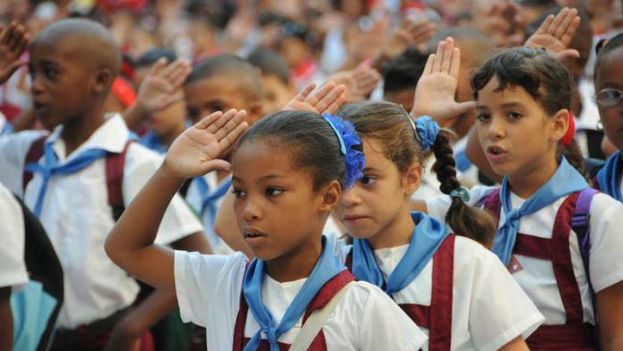
Yoani Sanchez, Generation Y, 11 February 2010 — It was a sober meeting attended by several representatives from the municipal Ministry of Education. A murmur passed among the parents, seated on the same plastic chairs used by their children in the morning. The date was approaching for the announcement of who would continue their studies at the senior secondary school; it appeared that at this meeting they would tell us the number of pre-university or technical school slots assigned to our school site. Thus, the news at the end about “comprehensive general teachers” took us by surprise, because we had come to believe that their existence would be extended until our great-grandchildren reached puberty.
Educating adolescents – through accelerated courses – to teach classes ranging from grammar to mathematics, turned out to be a categorical failure. Not because of the element of youth, which is always welcome in any profession, but because of the speed of their instruction in teaching and the lack of interest many of them had in such a noble endeavor.
Faced with the exodus of education professionals to other sectors with more attractive earnings, the emerging teachers program was developed; with it the already ailing quality of Cuban education fell through the floor. The children came home saying that in 1895 Cuba had lived through “a civil war” and that geometric figures had something called “voldes” which we parents understood to mean “edges.” I particularly remember one of these instant educators who confessed to his students on the first day of class that they should, “Study hard so you don’t end up like me, someone who ended up being a teacher because I didn’t take good notes.”
On top of that the tele-classes arrived, to fill a very high percentage of the school hours from the coldness of a screen that cannot interact. The idea was to make up for the lack of training of those standing in front of the students with these lessons transmitted by television. The tele-teacher substituted in many schools for the flesh-and-blood version, while teacher salaries increased symbolically, but never exceeded the equivalent of 30 dollars a month. Teaching became, even more than being a priest, a sacrifice.
Thus, standing in front of the blackboard were people who had not mastered spelling or the history of their own country. There were young people who signed a pledge to become teachers, but who already regretted it after one week of work. The incidents and educational deformations that this procedure brought with it are written in the hidden book of failure of revolutionary plans and ridiculous production goals that are never met, with the difference that in this case we are not talking about tons of sugar or bushels of beans, but about the education of our children.
I breathe a sigh of relief that this long experiment in emergent education has ended. However, I do not envision the day in which all those people with preparation to teach leave the wheel of their taxis, come out from behind the bar, or exchange the tedium of working at home to return to the classroom. At least I could feel more relaxed if, in place of a television screen, Teo could receive all his classes from a corporeal teacher with a mastery of the content. I think that in this case we will have to wait for the great-grandchildren.
